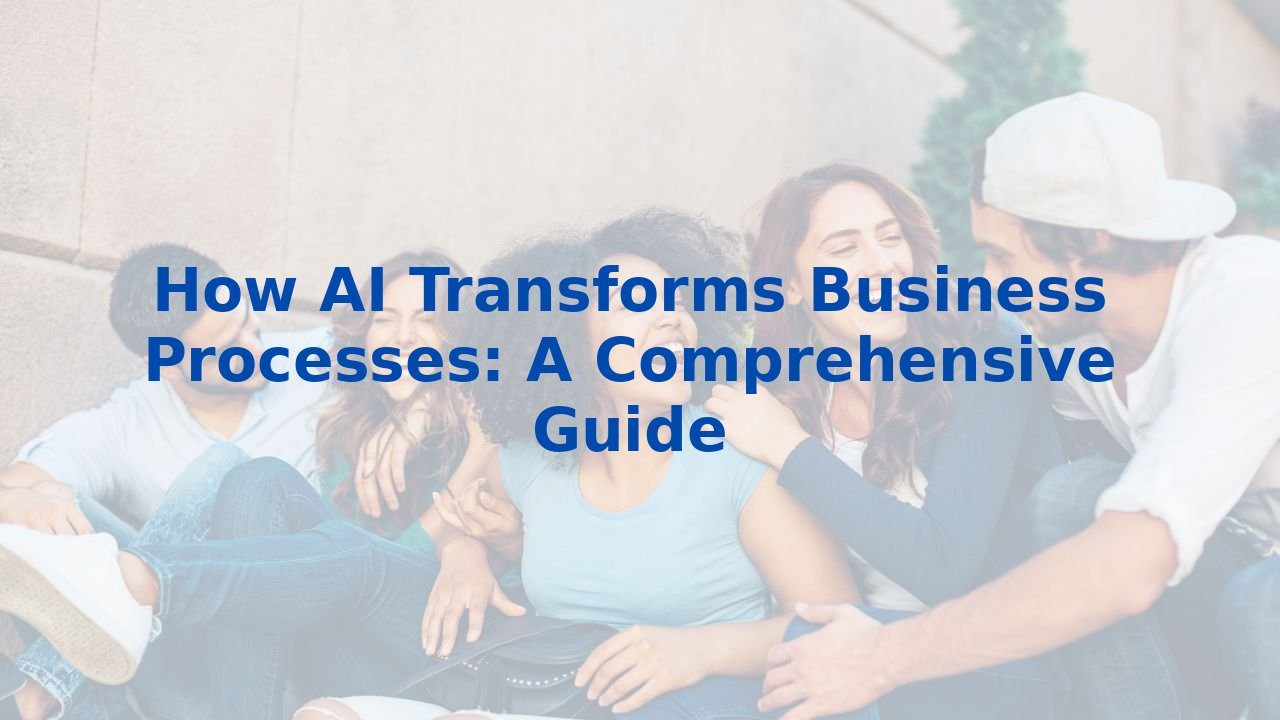How AI Transforms Business Processes: A Comprehensive Guide
How AI Enhances Business Processes: A Comprehensive Guide
In our rapidly evolving business landscape, organizations are on a quest for efficiency, cost reduction, and enhanced decision-making. Enter artificial intelligence (AI)—a transformative force that revolutionizes the very fabric of business processes. This guide explores how AI amplifies essential operations while emphasizing the undeniable advantages of integrating AI into a company's workflow.
1. Data Analysis and Decision-Making
AI takes the guesswork out of decision-making by swiftly processing vast datasets. It uncovers trends, forecasts outcomes, and traces root causes—turning mountains of data into actionable insights. By leveraging AI for data analysis, businesses gain the ability to make informed tactical and strategic decisions that bolster operational efficiency and refine their processes.
2. Process Building and Automation
In the realm of process management, AI excels at building and automating workflows. It can streamline the creation of new processes based on user-defined parameters, thus shortening the time and complexity involved in traditional process mapping. Automation of tasks previously relegated to humans allows companies to allocate their human resources toward more strategic pursuits, maximizing productivity.
3. HR Processes
AI is rewriting the rulebook in human resources. By enhancing objectivity in hiring practices and improving employee experiences, AI transforms key HR functions such as recruitment, salary negotiations, and onboarding. This technology personalizes career paths and restructures unstructured data, allowing HR teams to focus more on meaningful interactions instead of administrative drudgery.
4. Sales and Marketing
AI’s impact on sales and marketing is nothing short of revolutionary. Automation of monotonous administrative tasks frees up time for sales teams to engage meaningfully with prospects. AI identifies the most effective sales channels and recommends lucrative upsell opportunities. Moreover, chatbots have become frontline assets, driving revenue and enhancing customer interactions while providing tailored sales journeys with intelligence that adapts to individual customer behaviors.
5. Customer Service
In the domain of customer service, AI empowers organizations to automate responses to common inquiries. It doesn’t stop there; AI also monitors the quality of human-driven support, accurately identifying areas for improvement. This dual approach not only optimizes customer experiences but also ensures that service standards remain high, every time.
6. Product Development
AI brings unprecedented innovation to product development through generative design, which explores all possible design combinations based on specified criteria. By eliminating inefficient prototypes, AI saves both time and resources, while its analytical capabilities identify bottlenecks, allowing teams to optimize their workflows seamlessly.
7. Content Generation
Content creation—a cornerstone of modern marketing—is streamlined by AI's ability to generate engaging material efficiently. Whether it's web copy, product descriptions, or research articles, automated content generation allows brands to conserve resources and focus on strategic priorities without compromising quality.
Benefits of AI in Business Processes
The advantages of adopting AI within business operations are manifold:
- Improved Efficiency: By automating routine tasks, AI minimizes human error and reduces the need for oversight, allowing teams to concentrate on higher-value activities.
- Enhanced Decision-Making: With predictive analytics, AI paints a clearer picture, equipping businesses with the information needed for sophisticated decision-making.
- Real-Time Monitoring: AI continually monitors processes, empowering organizations to identify and resolve issues proactively, thereby optimizing performance.
- Process Optimization: AI analyzes historical data to reveal patterns and dependencies, enabling businesses to refine workflows and eliminate bottlenecks.
- Continuous Improvement: By fostering a culture of feedback and data-driven insights, AI encourages organizations to adapt processes iteratively, aligning them with ever-evolving business needs.
The Role of Employee Training in AI Implementation
AI’s potential is only fully realized when employees are equipped to harness its capabilities effectively. Emphasizing training is crucial. Here’s how organizations can prepare their workforce:
- Understanding AI Capabilities: Education on how AI functions is vital for employees to integrate it seamlessly into their daily routines.
- Data Analysis Skills: Empowering employees with analytical skills ensures they can interpret and leverage the insights generated by AI.
- Automation and Process Management: Training on using AI tools for task automation fosters a more efficient workflow.
- Continuous Learning: A culture of ongoing training keeps employees updated on advancements in AI, ensuring they remain at the forefront of industry evolution.
In conclusion, the integration of AI into business processes heralds a new era of operational excellence. By understanding its impact and investing in employee training, organizations can unlock the full potential AI offers, thus laying a robust foundation for future success.



